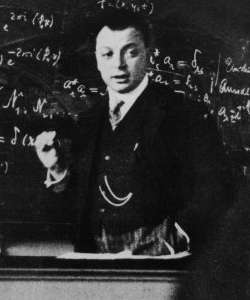Wolfgang Pauli
Wolfgang Ernst Pauli (25 April 1900 – 15 December 1958) was an Austrian-born Swiss and American theoretical physicist and one of the pioneers of quantum physics. He is best known for his formulation of the Pauli exclusion principle, a cornerstone of modern quantum mechanics that no two identical fermions (particles with half-integer spin) may occupy the same quantum state simultaneously. Pauli was awarded the Nobel Prize in Physics in 1945 for his discovery of the exclusion principle, also known as the Pauli principle.
Biography[edit | edit source]
Wolfgang Pauli was born in Vienna, Austria, to a family of intellectuals. His godfather was the physicist Ernst Mach, a fact that likely influenced his early interest in physical science. Pauli was a child prodigy in physics and mathematics, publishing his first scientific paper at the age of 20. He received his PhD from the University of Munich under the supervision of Arnold Sommerfeld, another prominent figure in the development of quantum mechanics.
In 1928, Pauli became a professor at the ETH Zurich in Switzerland, where he made significant contributions to the field of quantum mechanics and quantum field theory. His work on the theory of spin and the discovery of the non-relativistic spin-statistics theorem were particularly influential. Pauli also contributed to the development of the theory of beta decay, proposing the existence of the neutrino to explain the continuous spectrum of beta particles.
Throughout his career, Pauli was known for his sharp criticism of scientific works, including his own, which earned him the nickname "the conscience of physics." His critical insights were highly valued by his peers, including Albert Einstein, who once remarked that Pauli was his "spiritual son" and "the conscience of physics."
Pauli Exclusion Principle[edit | edit source]
The Pauli exclusion principle, formulated in 1925, is a quantum mechanical principle that states that two or more identical fermions (particles with half-integer spin) cannot occupy the same quantum state within a quantum system simultaneously. This principle is a fundamental aspect of quantum mechanics and has profound implications for the structure of atoms and molecules, the properties of solids, and the stability of matter.
Legacy[edit | edit source]
Wolfgang Pauli's contributions to physics were immense and far-reaching. Beyond the exclusion principle, his work on the theory of spin and the prediction of the neutrino were groundbreaking. The Pauli matrices, which he introduced, are crucial in the study of quantum mechanics and quantum field theory. Pauli's theoretical work laid the groundwork for many important discoveries in physics, including the development of quantum electrodynamics.
Pauli was a member of the Niels Bohr Institute for Theoretical Physics and was closely associated with many of the 20th century's leading physicists. He was also a member of the Institute for Advanced Study in Princeton, New Jersey.
Pauli passed away in Zurich, Switzerland, on 15 December 1958. His legacy continues to influence the field of physics, and he is remembered as one of the key figures in the development of modern quantum mechanics.
Search WikiMD
Ad.Tired of being Overweight? Try W8MD's physician weight loss program.
Semaglutide (Ozempic / Wegovy and Tirzepatide (Mounjaro / Zepbound) available.
Advertise on WikiMD
|
WikiMD's Wellness Encyclopedia |
| Let Food Be Thy Medicine Medicine Thy Food - Hippocrates |
Translate this page: - East Asian
中文,
日本,
한국어,
South Asian
हिन्दी,
தமிழ்,
తెలుగు,
Urdu,
ಕನ್ನಡ,
Southeast Asian
Indonesian,
Vietnamese,
Thai,
မြန်မာဘာသာ,
বাংলা
European
español,
Deutsch,
français,
Greek,
português do Brasil,
polski,
română,
русский,
Nederlands,
norsk,
svenska,
suomi,
Italian
Middle Eastern & African
عربى,
Turkish,
Persian,
Hebrew,
Afrikaans,
isiZulu,
Kiswahili,
Other
Bulgarian,
Hungarian,
Czech,
Swedish,
മലയാളം,
मराठी,
ਪੰਜਾਬੀ,
ગુજરાતી,
Portuguese,
Ukrainian
Medical Disclaimer: WikiMD is not a substitute for professional medical advice. The information on WikiMD is provided as an information resource only, may be incorrect, outdated or misleading, and is not to be used or relied on for any diagnostic or treatment purposes. Please consult your health care provider before making any healthcare decisions or for guidance about a specific medical condition. WikiMD expressly disclaims responsibility, and shall have no liability, for any damages, loss, injury, or liability whatsoever suffered as a result of your reliance on the information contained in this site. By visiting this site you agree to the foregoing terms and conditions, which may from time to time be changed or supplemented by WikiMD. If you do not agree to the foregoing terms and conditions, you should not enter or use this site. See full disclaimer.
Credits:Most images are courtesy of Wikimedia commons, and templates, categories Wikipedia, licensed under CC BY SA or similar.
Contributors: Prab R. Tumpati, MD




